
Reality is changing so fast, we can hardly imagine life in five years’ time. Can the past help us build a better future?
For any country today, innovation is a reality and a necessity. At Intelligent Management we are thrilled to have been chosen to create a whole new area called “Science for Organizations” for the global platform www.innovando.news dedicated to Innovation. Innovando.news is internationally recognized as a reference point of authoritativeness, with contributions from entities such as NASA and CERN, the Wall Street Journal and leading brands such as Ferrari. We will be sharing regular articles on the elements of science that dramatically improve organizational and economic performance. COMING SOON! We are excited that these articles will have global exposure to millions of viewers. It is a unique opportunity to share the knowledge, method and tools that people will not learn in business schools but that are essential for business success in today’s world of complexity. Ironically, much of this knowledge has been around for decades, but it is key for developing continuous innovation. The more people adopt a systemic approach to business, the more we can build a better future economically and create purpose-oriented organizations that carry out meaningful work.
Does the past define us or can it help us build a better future?
At Intelligent Management, where we are British, Italian and all new Canadians, it’s a particularly significant time. Recently, Canada received a visit from King Charles III and this week Italy celebrated being a Republic. Canada and Italy (where we are currently visiting for projects and family) have made very different choices about how they are governed. Both countries face considerable challenges for the future. When feelings about the future are filled with fear, it can be tempting to look to the past for answers. When we look to the past, it is important to distinguish nostalgia from wisdom that we can use in the present to build a better future. Were things really any better in the past than they are today? Statistics will tell us otherwise. And there is only one thing that really counts and that is our ability to make intelligent choices here and now. We can learn how to do this in a consistent and effective way.
A voice from the past that can certainly help us shape a better future is that of Dr. W. Edwards Deming. After the devastation of WWII, the Japanese were able to listen to, absorb and put into practice the wisdom of Dr. Deming. From the ruins, they arose to became an economic super power. The USA did not listen the same way. America continued to pay attention to quarterly results and not enough to Quality as an economic driver. Improve Quality, reduce cost, create jobs. You can hear this directly from Dr. Deming in this clip posted this week on LinkedIn by William ScherkenbachWilliam Scherkenbach
This week there was also an article about innovation and Deming’s Plan, Do Study, Act PDSA cycle, reminding us of the universal importance and applicability of this fundamental tool:
Why companies need to lean into their systemic nature
Dr. Deming taught us that an organization is a system, whether it knows it or not. A system, as Deming defines it, is a network of interdependent components that work together to achieve a common goal. Through our work over the years at Intelligent Management, it is increasingly clear that this systemic nature is not something we need to impose, it is something we can reveal. This starts with identifying the main processes that allow the company to operate, mapping the processes and beginning to monitor the variation that affects them so we know where and when to intervene to improve. Just carrying out this first step will lead to a better understanding of flow in the company and any blockages that can be easily removed.
Siloed business functions and departments that prevent free flow of information and interactions are an artificial imposition. They exist because of flawed assumptions about control. They create unnecessary barriers that prevent companies from effectively embracing the new technologies they need to be productive and competitive. A recent article about AI states: “Done right, AI systems can radically change how information moves through a company. “You’re making information sharing easier,” he says. Mistral encourages its customers to break down silos so data can flow across departments.”
Recommended reading: Synchronizing Competencies Accelerate Throughput and Overcomes Silos
Is democracy at a crossroads?
Another recent thought-provoking article reflects on democracy and capitalism. The author, Kojo Koram, comments on taking his six-year-old daughter from the UK to visit Hong Kong. She is struck by its modernity and futuristic tech. When Koram was growing up, “Britain, the US and some parts of western Europe were the “developed world”. Everywhere else was “developing”. ” Now, instead, Asia and the Middle East are the futuristic destinations. Autocratic states are able to build at speed what mature democracies struggle to realize. “The idea that capitalism might work best with limited, or even nonexistent, democracy is quietly becoming more acceptable.” It is startling to read that “According to a Channel 4 study from earlier this year, 52% of gen Zers felt the UK would be a better place “if a strong leader was in charge who does not have to bother with parliament and elections”. This is a wake up call for democratically elected politicians to leave aside personal ambitions and agendas and commit to public service, making choices that put the interest of their country and the future wellbeing of its citizens first.
The King came to Canada
As a British new Canadian and Ottawa resident, I was particularly moved by the Throne Speech given by King Charles III to open the first session of the 45th Parliament of Canada. The occasion was solemn but, instead of the pomp of Westminster with crowns and tiaras, there was a special Canadian, friendly dignity among the representatives of various ethnicities and First Nations. The message in the speech was clear: there are unprecedented threats but there is also a great opportunity for Canada to think big and act bigger. Helping companies to think big and act bigger is precisely the mandate of the Theory of Constraints and we look forward to helping many more companies go beyond what they currently imagine to be possible. As Dr. Goldratt is famous for saying, the sky is not the limit.
Remove silos, choose growth
If you are interested in removing silos in your company to accelerate sustainable growth, that is why we as Intelligent Management exist. We are here to help companies with a true desire to unveil their intrinsic systemic nature so they can grow and thrive. And it’s always a pleasure to receive feedback:
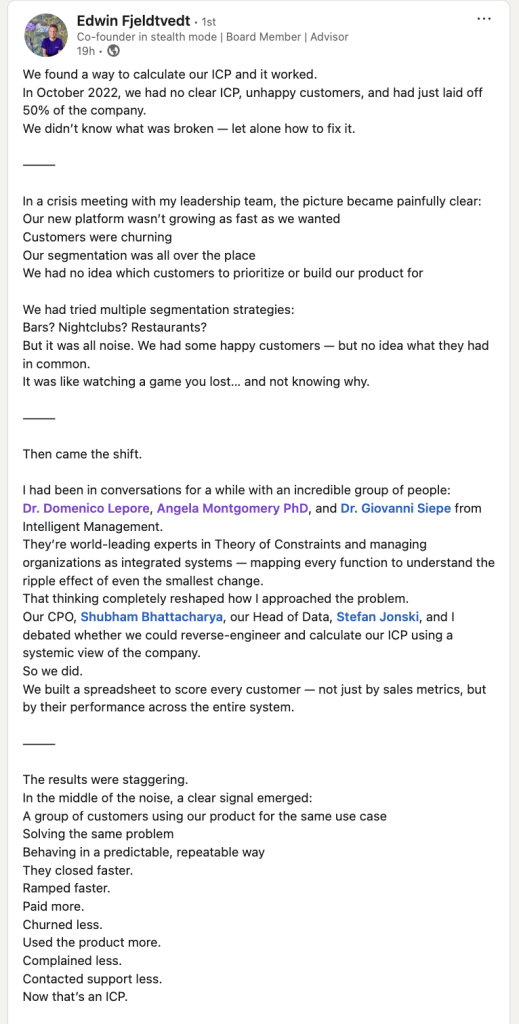
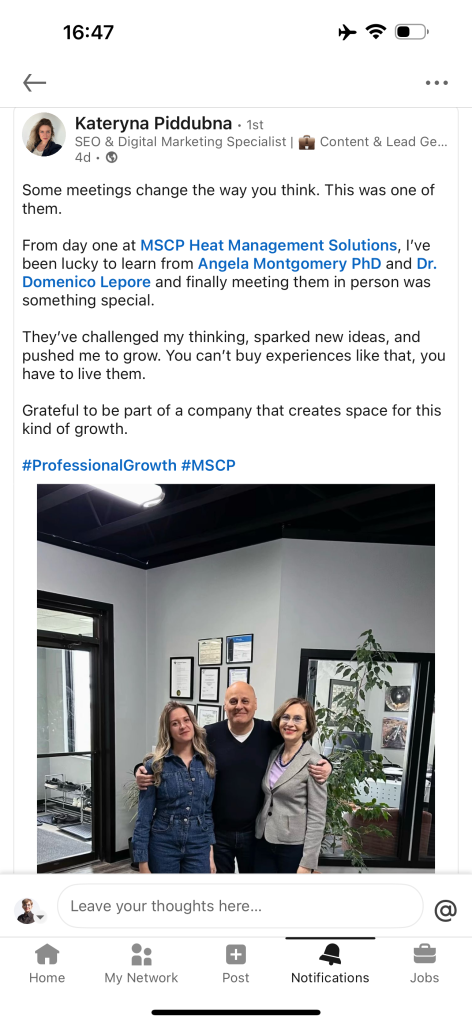
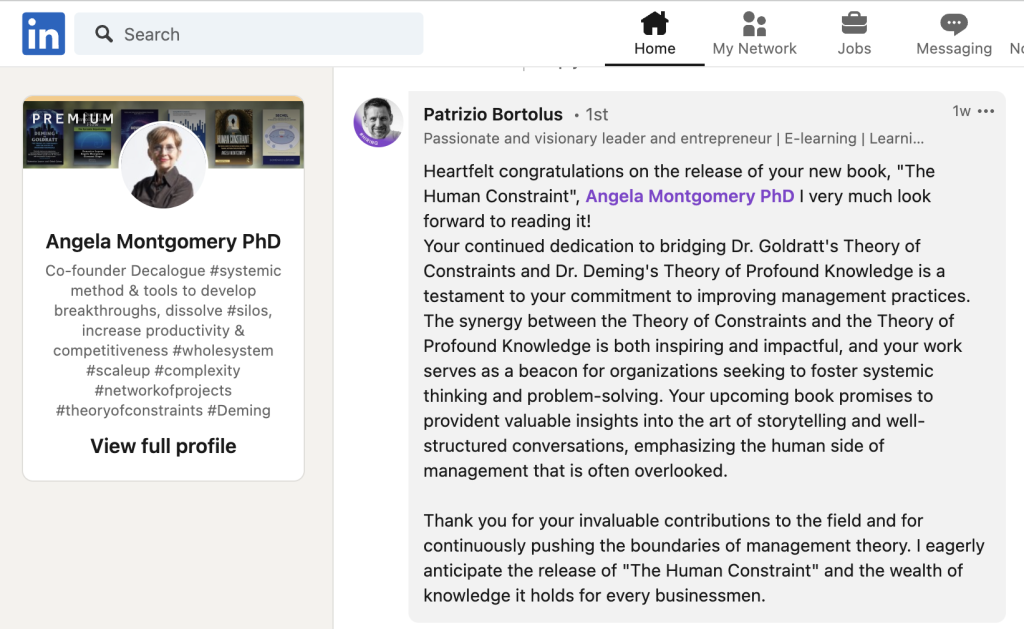
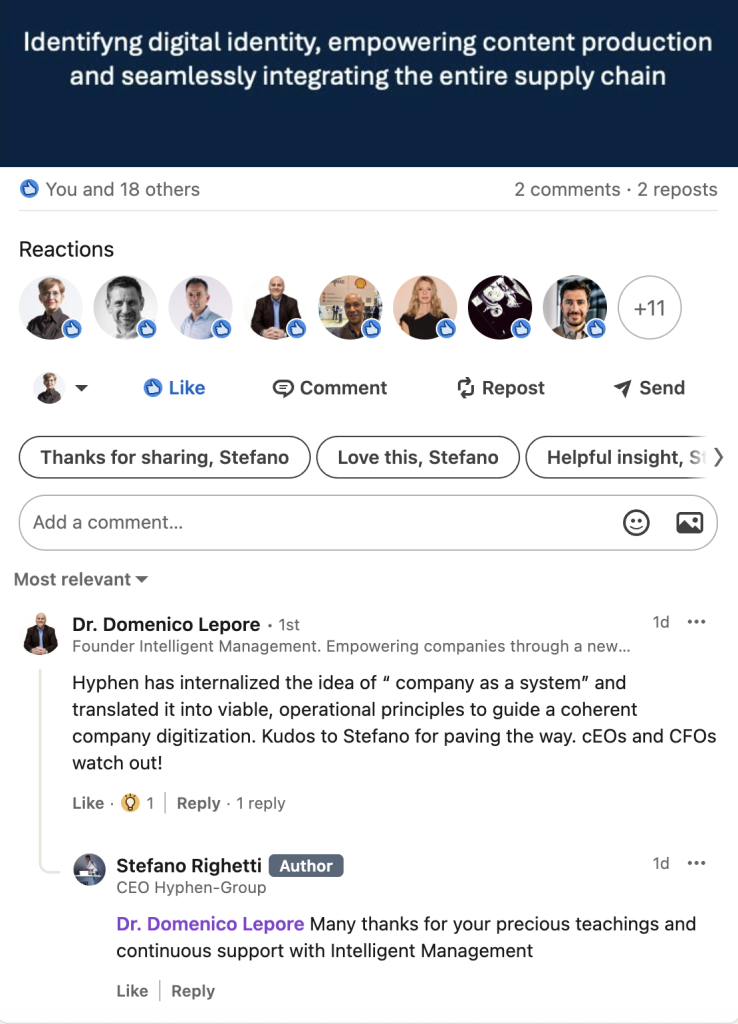
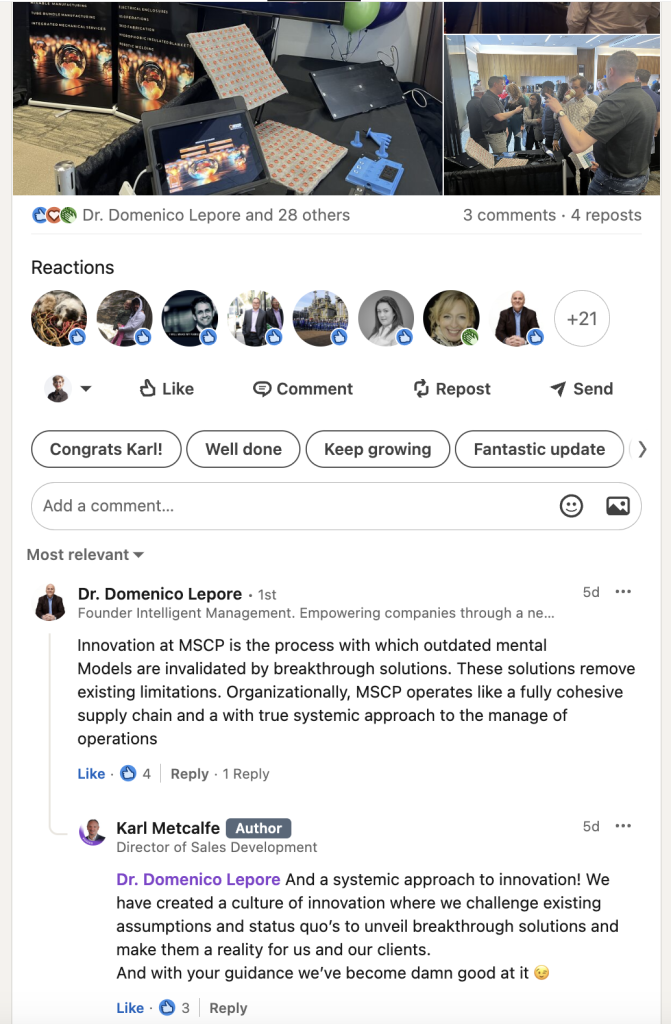
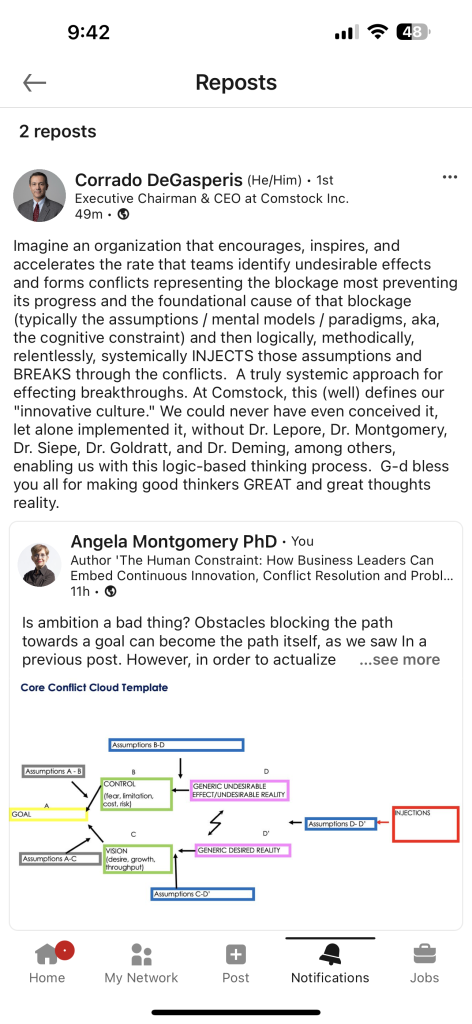
To find out more about ten guided steps to a systemic leap in performance for your company, contact Angela Montgomery at: intelligentmanagement@sechel.ws
SCHEDULE AN INTRODUCTORY CALL WITH US

Intelligent Management works with decision makers with the authority and responsibility to make meaningful change to optimize your company for the digital age. We have helped dozens of organizations to adopt a systemic approach to manage complexity and radically improve performance and growth for over 25 years through our Decalogue management methodology. The Network of Projects organization design we developed is supported by our Ess3ntial software for multi-project finite scheduling based on the Critical Chain algorithm.
See our latest books: The Human Constraint from Routledge; From Silos to Networks: A New Kind of Science for Management from Springer; Moving the Chains: An Operational Solution for Embracing Complexity in the Digital Age by our Founder Dr. Domenico Lepore, and ‘Quality, Involvement, Flow: The Systemic Organization’ from CRC Press, New York by Dr. Domenico Lepore, Dr. Angela Montgomery and Dr. Giovanni Siepe.





Leave a Reply